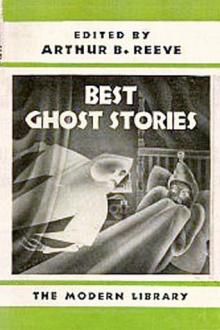In a Steamer Chair and Other Stories - Robert Barr (rm book recommendations .TXT) 📗

- Author: Robert Barr
Book online «In a Steamer Chair and Other Stories - Robert Barr (rm book recommendations .TXT) 📗». Author Robert Barr
"I was just going to send for you," he said.
"I did not sleep any," was the answer, "and the moment the engine stopped I knew we were there. Shall we go on deck?"
"Yes," he said, "but come away from the crowd," and with that he led her towards the stern of the boat. For a moment Miss Earle seemed to hold back, but finally she walked along by his side firmly to where they had stood the night before. With seeming intention Morris tried to take his place beside her, but Miss Earle, quietly folding her cloak around her, stood on the opposite side of the flagpole, and, as if there should be no forgetfulness on his part, she reached up her hand and laid it against the staff.
"She evidently meant what she said," thought Morris to himself, with a sigh, as he watched the low, dim outlines of the hills around Queenstown Harbour, and the twinkling lights here and there.
"That is the tender coming now," he said, pointing to the red and green lights of the approaching boat. "How small it looks beside our monster steamship."
Miss Earle shivered.
"I pity the poor folks who have to get up at this hour of the night and go ashore. I should a great deal rather go back to my state-room."
"Well, there is one passenger I am not sorry for," said Morris, "and that is the young woman who has, I am afraid, been saying something to you which has made you deal more harshly with me than perhaps you might otherwise have done. I wish you would tell me what she said?"
"She has said nothing," murmured Miss Earle, with a sigh, "but what you yourself have confirmed. I do not pay much attention to what she says." "Well, you don't pay much attention to what I say either," he replied. "However, as I say, there is one person I am not sorry for; I even wish it were raining. I am very revengeful, you see."
"I do not know that I am very sorry for her myself," replied Miss Earle, frankly; "but I am sorry for her poor old father, who hasn't appeared in the saloon a single day except the first. He has been sick the entire voyage."
"Her father?" cried Morris, with a rising inflection in his voice.
"Certainly."
"Why, bless my soul! Her father has been dead for ages and ages."
"Then who is the old man she is with?"
"Old man! It would do me good to have her hear you call him the old man. Why, that is her husband."
"Her husband!" echoed Miss Earle, with wide open eyes, "I thought he was her father."
"Oh, not at all. It is true, as you know, that I was engaged to the young lady, and I presume if I had become a partner in our firm sooner we would have been married. But that was a longer time coming than suited my young lady's convenience, and so she threw me over with as little ceremony as you would toss a penny to a beggar, and she married this old man for his wealth, I presume. I don't see exactly why she should take a fancy to him otherwise. I felt very cut up about it, of course, and I thought if I took this voyage I would at least be rid for a while of the thought of her. They are now on their wedding trip. That is the reason your steamer chair was broken, Miss Earle. Here I came on board an ocean steamer to get rid of the sight or thought of a certain woman, and to find that I was penned up with that woman, even if her aged husband was with her, for eight or nine days, was too much for me. So I raced up the deck and tried to get ashore. I didn't succeed in that, but I _did_ succeed in breaking your chair."
Miss Earle was evidently very much astonished at this revelation, but she said nothing. After waiting in vain for her to speak, Morris gazed off at the dim shore. When he looked around he noticed that Miss Earle was standing on his side of the flagstaff. There was no longer a barrier between them.
SEVENTH DAY.
If George Morris were asked to say which day of all his life had been the most thoroughly enjoyable, he would probably have answered that the seventh of his voyage from New York to Liverpool was the red-letter day of his life. The sea was as calm as it was possible for a sea to be. The sun shone bright and warm. Towards the latter part of the day they saw the mountains of Wales, which, from the steamer's deck, seemed but a low range of hills. It did not detract from Morris's enjoyment to know that Mrs. Blanche was now on the troubleless island of Ireland, and that he was sailing over this summer sea with the lady who, the night before, had promised to be his wife.
During the day Morris and Katherine sat together on the sunny side of the ship looking at the Welsh coast. Their books lay unread on the rug, and there were long periods of silences between them.
"I don't believe," said Morris, "that anything could be more perfectly delightful than this. I wish the shaft would break."
"I hope it won't," answered the young lady; "the chances are you would be as cross as a bear before two days had gone past, and would want to go off in a small boat."
"Oh, I should be quite willing to go off in a small boat if you would come with me. I would do that now."
"I am very comfortable where I am," answered Miss Katherine. "I know when to let well enough alone."
"And I don't, I suppose you mean?"
"Well, if you wanted to change this perfectly delightful day for any other day, or this perfectly luxurious and comfortable mode of travel for any other method, I should suspect you of not letting well enough alone."
"I have to admit," said George, "that I am completely and serenely happy. The only thing that bothers me is that to-night we shall be in Liverpool. I wish this hazy and dreamy weather could last for ever, and I am sure I could stand two extra days of it going just as we are now. I think with regret of how much of this voyage we have wasted."
"Oh, you think it was wasted, do you?"
"Well, wasted as compared with this sort of life. This seems to me like a rest after a long chase."
"Up the deck?" asked the young lady, smiling at him.
"Now, see here," said Morris, "we may as well understand this first as last, that unfortunate up-the-deck chase has to be left out of our future life. I am not going to be twitted about that race every time a certain young lady takes a notion to have a sort of joke upon me."
"That was no joke, George. It was the most serious race you ever ran in your life. You were running away from one woman, and, poor blind young man, you ran right in the arms of another. The danger you have run into is ever so much greater than the one you were running away from."
"Oh, I realise that," said the young man, lightly; "that's what makes me so solemn to-day, you know." His hand stole under the steamer rugs and imprisoned her own.
"I am afraid people will notice that," she said quietly.
"Well, let them; I don't care. I don't know anybody on board this ship, anyhow, except you, and if you realised how very little I care for their opinions you would not try to withdraw your hand."
"I am not trying very hard," answered the young woman; and then there was another long silence. Finally she continued--
"I am going to take the steamer chair and do it up in ribbons when I get ashore."
"I am afraid it will not be a very substantial chair, no matter what you do with it. It will be a trap for those who sit in it."
"Are you speaking of your own experience?"
"No, of yours."
"George," she said, after a long pause, "did you like her very much?"
"Her?" exclaimed the young man, surprised. "Who?"
"Why, the young lady you ran away from. You know very well whom I mean."
"Like her? Why, I hate her."
"Yes, perhaps you do now. But I am asking of former years. How long were you engaged to her?"
"Engaged? Let me see, I have been engaged just about--well, not twenty-four hours yet. I was never engaged before. I thought I was, but I wasn't really."
Miss Earle shook her head. "You must have liked her very much," she said, "or you never would have proposed marriage to her. You would never have been engaged to her. You never would have felt so badly when she--"
"Oh, say it out," said George, "jilted me, that is the word."
"No, that is not the phrase I wanted to use. She didn't really jilt you, you know. It was because you didn't have, or thought you didn't have, money enough. She would like to be married to you to-day."
George shuddered.
"I wish," he said, "that you wouldn't mar a perfect day by a horrible suggestion."
"The suggestion would not have been so horrible a month ago."
"My dear girl," said Morris, rousing himself up, "it's a subject that I do not care much to talk about, but all young men, or reasonably young men, make mistakes in their lives. That was my mistake. My great luck was that it was discovered in time. As a general thing, affairs in this world are admirably planned, but it does seem to me a great mistake that young people have to choose companions for life at an age when they really haven't the judgment to choose a house and lot. Now, confess yourself, I am not your first lover, am I?"
Miss Earle looked at him for a moment before replying.
"You remember," she said, "that once you spoke of not having to incriminate yourself. You refused to answer a question I asked you on that ground. Now, I think this is a case in which I would be quite justified in refusing to answer. If I told you that you were my first lover, you would perhaps be manlike enough to think that after all you had only taken what nobody else had expressed a desire for. A man does not seem to value anything unless some one else is struggling





Comments (0)